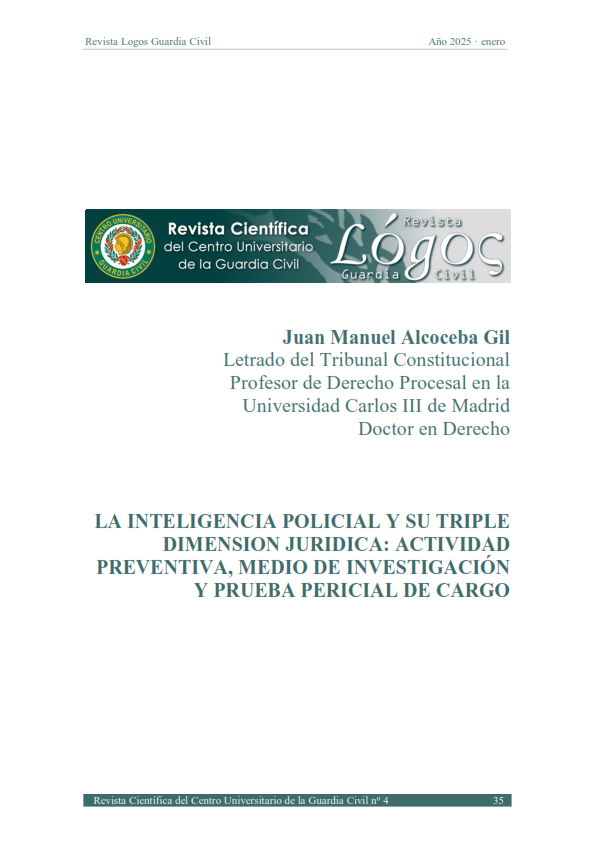Police intelligence and its triple legal dimension: preventive activity, means of investigation and expert evidence for the prosecution
Keywords:
Police intelligence, criminal prosecution, intelligence evidence, terrorism, organized crime, criminal investigationAbstract
Police intelligence is a powerful tool for the prevention, investigation and prosecution of serious crime such as organized crime and terrorism. This is recognized by the international community, led by the USA and the EU, which since the beginning of this century has been promoting a criminal policy model based on the collection, storage and analysis of information as a fundamental pillar for the early detection of security threats. However, despite its obvious practical importance, police intelligence work is difficult to categorize from a criminal law perspective. Spanish procedural legislation does not expressly provide for its validity as an element of conviction at the time of sentencing, nor does it contemplate specific ways for its use in the framework of criminal cases. Only case law has given procedural recognition to this type of analysis, incorporating it into the act of the oral trial and, therefore, into the body of evidence, as expert evidence. However, the jurisprudential construction of the so-called intelligence expert evidence, in addition to presenting an atypical character with respect to the classic conception of this means of evidence, leaves out the relevant effects that this police activity has in stages prior to the prosecution of the crimes. Therefore, in order to evaluate the true place of police intelligence in the criminal justice system, it is necessary to locate its origin and functions within the field of prevention, as an extra or pre-procedural action, and not only as prosecution evidence.
Downloads
References
ALCOCEBA GIL, J.M. Nacimiento y expansión de un nuevo modelo de política criminal: El Derecho Penal Anticipativo. Valencia: Tirant lo Blanch (2023).
BACHMAIER WINTER, L. "Información de Inteligencia y Proceso Penal", en Terrorismo, Proceso penal y derechos fundamentales. (Coord) BACHMAIER WINTER, L. Madrid: Marcial Pons (2012).
CASTILLEJO MANZANARES, R. “La prueba pericial de inteligencia”. Diario La Ley. Nº. 7756, 2011; GUERRERO PALOMARES, S. “La denominada «prueba de inteligencia policial» o «pericial de inteligencia»”. Revista de derecho y proceso penal. Nº. 25 (2011).
GÓMEZ COLOMER, J. L. (Dir.). Derecho Jurisdiccional III. Valencia: Tirant lo Blanch (2019).
GUDÍN RODRÍGUEZ-MAGARIÑOS, F. “La presunta prueba pericial de inteligencia: análisis de la STS de 22 de mayo de 2009”. La ley penal: revista de derecho penal, procesal y penitenciario. Nº. 64 (2009).
GUILLÉN LÓPEZ, E. “Inserción de las FAS en un sistema integral de intervención: Terrorismo, inmigración ilegal, crimen organizado, protección en el ámbito civil”. Revista ejército. Nº. 846 (2011).
HERNÁNDEZ DOMÍNGUEZ, J. J. “Valor procesal del informe de inteligencia policial”, Diario La Ley, N.º 8174 (2013).
LÓPEZ ORTEGA, J. J. Y ALCOCEBA GIL, J. M. "Prevenir y evitar: consideraciones en torno a un modelo de intervención penal anticipativa", en JUANATEY DORADO, C. Y SÁNCHEZ-MORALEDA VILCHES, N. (Coords.). Derechos del condenado y necesidad de pena, por Pamplona: Aranzadi (2018).
LÓPEZ ORTEGA J. J. “¿Puede reconocerse algún valor probatorio a la denominada prueba pericial de inteligencia (análisis de información)?” en HERNÁNDEZ J. (Dir.) 113 Cuestiones sobre la prueba en el proceso penal. Cuadernos Digitales de Formación. Consejo General del Poder Judicial Nº31 (2013).
NIEVA FENOLL, J. “La protección de derechos fundamentales en las diligencias policiales de investigación del proceso penal”. La ley penal: revista de derecho penal, procesal y penitenciario, Nº. 50 (2008).
PRIETO DEL VAL, T. F. “La inteligencia militar, una constante histórica”. Instituto Español de Estudios Estratégicos, Nº 79 (2014).
ROSALES PARDO, I. A. "La inteligencia en los procesos de toma de decisiones en la seguridad y defensa", Cuadernos de estrategia, Nº130 (2005).
SÁEZ VALCÁRCEL, R. "Pericia de inteligencia: prueba penal y erudición de estado", Revista Jueces para la democracia, Nº88, (2017).
SACRISTÁN PARIS, F. La inteligencia en la lucha contra las nuevas amenazas: la delincuencia organizada trasnacional. Madrid: Instituto Universitario de Investigación sobre Seguridad Interior (2011).

Downloads
Published
How to Cite
Issue
Section
License
Copyright (c) 2025 Juan Manuel Alcoceba Gil

This work is licensed under a Creative Commons Attribution-NonCommercial-NoDerivatives 4.0 International License.
-
Attribution — You must give appropriate credit, provide a link to the license, and indicate if changes were made. You may do so in any reasonable manner, but not in any way that suggests the licensor endorses you or your use.
-
NonCommercial — You may not use the material for commercial purposes.
-
NoDerivatives — If you remix, transform, or build upon the material, you may not distribute the modified material.
- No additional restrictions — You may not apply legal terms or technological measures that legally restrict others from doing anything the license permits.



